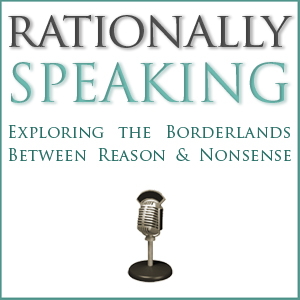Rationally Speaking #163 - Gregg Caruso on "Free Will and Moral Responsibility"
Rationally Speaking Podcast
New York City Skeptics
4.6 • 787 Ratings
🗓️ 10 July 2016
⏱️ 60 minutes
🧾️ Download transcript
Summary
Transcript
Click on a timestamp to play from that location
| 0:00.0 | Rationally Speaking is a presentation of New York City skeptics dedicated to promoting critical thinking, skeptical inquiry, and science education. |
| 0:22.5 | For more information, please visit us at NYCCEceptics.org. |
| 0:31.2 | Welcome to Rationally Speaking, the podcast where we explore the borderlands between reason and nonsense. |
| 0:41.5 | I'm your host, Julia Galef, and with me is today's guest, Professor Greg Caruso. |
| 0:46.5 | Greg is Associate Professor of Philosophy at SUNY Corning. |
| 0:49.8 | He's also the co-director of the Justice Without Retribution Network, and the founder and editor-in-chief of science, religion, and culture. |
| 0:57.0 | He's written multiple books and writes for publications like psychology today. |
| 1:01.1 | And one of Greg's main areas of focus is the topic of free will and moral responsibility. |
| 1:07.6 | So that's what we're going to be talking about on today's episode. |
| 1:11.0 | I intend for us to tackle a whole cluster of related questions, including if people don't |
| 1:19.1 | have free will, then can they be said to be morally responsible for their actions? |
| 1:23.6 | For example, are criminals morally responsible for their crimes? |
| 1:27.5 | Relatedly, of course, what do we mean by the question, do people have free will? |
| 1:32.8 | And then also, the related question, if we as a society collectively decided that free will doesn't exist, would the consequences of that decision be good or bad for society? |
| 1:46.7 | So, Greg, welcome to rationally speaking. Hi, Julia. Hi. Thank you for having me. It's a pleasure. Looking forward to the |
| 1:51.6 | conversation. So, Greg, you, on this topic, you've described yourself as an optimistic skeptic. |
| 1:58.7 | Can you explain what you mean by that? Well, the first begins with the notion |
| 2:03.4 | that I'm a skeptic. So by a skeptic, I mean a free will skeptic. And free will skeptics either doubt or |
| 2:10.3 | deny the existence of free will. So it's a large cluster of views. I'm more of the view that we lack free will. So as a free will skeptic, |
| 2:21.7 | as I'm using the term, it basically maintains that who we are, what we do is ultimately the result |
| 2:27.3 | of factors beyond our control. And because of this, we lack the kind of moral responsibility |
| 2:33.2 | that would make us truly deserving of praise |
... |
Please login to see the full transcript.
Disclaimer: The podcast and artwork embedded on this page are from New York City Skeptics, and are the property of its owner and not affiliated with or endorsed by Tapesearch.
Generated transcripts are the property of New York City Skeptics and are distributed freely under the Fair Use doctrine. Transcripts generated by Tapesearch are not guaranteed to be accurate.
Copyright © Tapesearch 2025.

